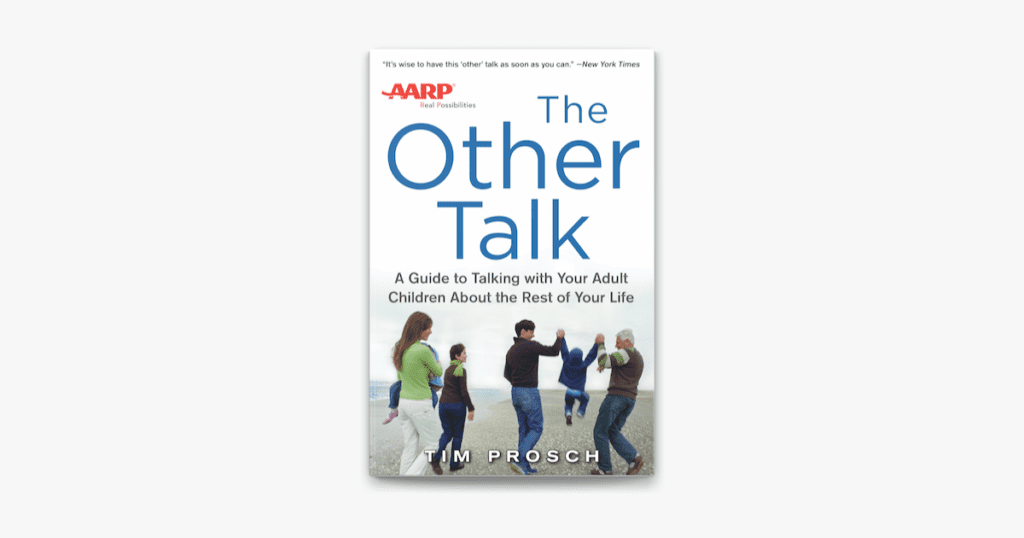“The Other Talk,” published in 2014, plays on the familiar concept of the birds and bees parent-child discussion to evoke a new context: preparing for the difficult decisions often faced as one ages. While the first “talk” is an important milestone for parents as they guide their children through adolescence and into adulthood, “the other talk” encourage parents to talk again, later in life with their adult children about financial, healthcare and end-of-life decisions as they grow older.
This book is powerfully written from a parent’s perspective. Many volumes of work address the who, what, when and why of caring for an aging parent, but most are written from the perspective of the child or caregiver and are reactive in nature. In “The Other Talk,” Prosch seeks to redefine the conversation, putting the parent in the driver’s seat. His proactive approach is vastly different from the often default approach where such choices are managed from crisis to crisis, without prior preparation.
Parents overwhelming goal, according to Prosch, is to not burden the kids with the issues they faced when caring for their own parents. In this book, the author walks the reader through specific steps intended to help them successfully attain this goal.
Prosch states, “The National Hospice Foundation found that 75 percent of Americans don’t make their end-of-life decisions known to their families through either verbal or written communication.” To address this glaring omission in planning, Prosch lays the framework for “The Other Talk.” Prosch first questions, on behalf of the reader, whether there is a need to devote attention to this often uncomfortable, unwieldy topic. In response, he reminds us that growing old can result in a role reversal between parent and child, where the parent fears becoming a burden and growing powerless while the caregiver can experience emotional and financial burdens, guilt, and family tension.
In spite of the potential difficulty of having such a conversation, the author cautions against a drive-by version of “the other talk.” He states, “You, the parent, are proactively taking the responsibility for empowering and preparing your kids for the reversal of roles that will take place in your later years. You, the parent, embrace the eventual reversal of roles, not as giving up power and control but rather as achieving security and freedom.”
Next, Prosch shifts from justifying the need for “the other talk” to setting the stage for it. Elder care planning requires time and preparation, and preparation is key to empowering the entire family to work toward a common goal of readiness for an eventual role reversal. He reminds us that just because we do not want to become a burden on our family, the desire alone does not stop it from happening.
Fortunately, proactive preparation can alleviate the burden by helping families to avoid family feuds, make financial preparations, sidestep unnecessary surprises, understand the parents’ wishes, and put the focus where it belongs: on living. Such preparation includes data gathering in additional to mental and emotional grounding in advance of “the other talk.”
Prosch also defines an action plan which includes sitting down as a family to outline which decisions and discussions should be addressed. These may range from financial considerations and legal documentation to living arrangements and medical decisions.
In closing, as your financial advisors we believe in planning for all aspects of life. While retirement planning, college funding, charitable giving and tax planning may seem to be the obvious areas to leverage our expertise, we are also well equipped to guide your choices in elder care planning.
As a resource, “The Other Talk” is a valuable read as it explores a practical framework and step by step process to prepare yourself and your family for elder care planning decisions. Much of the text is dedicated to creating an organized system to document and convey your decisions and discussions.
SYM offers clients a software tool to help in the organization and codification of end-of-life wishes and share them with family and close friends. The program, Everplans, is a web-based portal for personal data, medical history, considerations for living arrangements as your independence begins to decline, and end of life wishes. The service is provided by SYM, but the information can be as shared or as confidential as you see fit.
We encourage you to reach out to your advisor to discuss the next step in elder care planning for your family.



